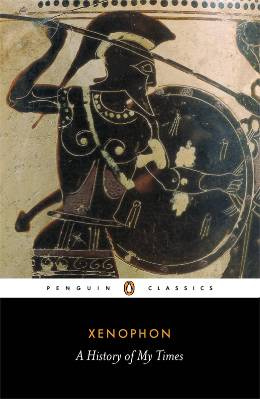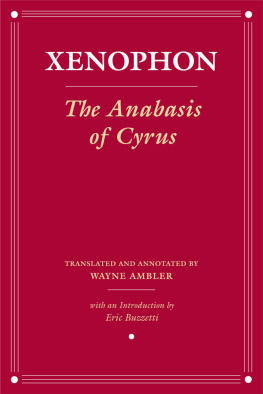Xenophon - Hellenica
Here you can read online Xenophon - Hellenica full text of the book (entire story) in english for free. Download pdf and epub, get meaning, cover and reviews about this ebook. year: 2012, genre: Adventure. Description of the work, (preface) as well as reviews are available. Best literature library LitArk.com created for fans of good reading and offers a wide selection of genres:
Romance novel
Science fiction
Adventure
Detective
Science
History
Home and family
Prose
Art
Politics
Computer
Non-fiction
Religion
Business
Children
Humor
Choose a favorite category and find really read worthwhile books. Enjoy immersion in the world of imagination, feel the emotions of the characters or learn something new for yourself, make an fascinating discovery.
Hellenica: summary, description and annotation
We offer to read an annotation, description, summary or preface (depends on what the author of the book "Hellenica" wrote himself). If you haven't found the necessary information about the book — write in the comments, we will try to find it.
Hellenica — read online for free the complete book (whole text) full work
Below is the text of the book, divided by pages. System saving the place of the last page read, allows you to conveniently read the book "Hellenica" online for free, without having to search again every time where you left off. Put a bookmark, and you can go to the page where you finished reading at any time.
Font size:
Interval:
Bookmark:
Xenophon the Athenian was born 431 B.C. He was a
pupil of Socrates. He marched with the Spartans,
and was exiled from Athens. Sparta gave him land
and property in Scillus, where he lived for many
years before having to move once more, to settle
in Corinth. He died in 354 B.C.
The Hellenica is his chronicle of the history of
the Hellenes from 411 to 359 B.C., starting as a
continuation of Thucydides, and becoming his own
brand of work from Book III onwards.
This was typed from Dakyns' series, "The Works of Xenophon," a four-volume set. The complete list of Xenophon's works (though there is doubt about some of these) is:
Work Number of books
The Anabasis 7
The Hellenica 7
The Cyropaedia 8
The Memorabilia 4
The Symposium 1
The Economist 1
On Horsemanship 1
The Sportsman 1
The Cavalry General 1
The Apology 1
On Revenues 1
The Hiero 1
The Agesilaus 1
The Polity of the Athenians and the Lacedaemonians 2
Text in brackets "{}" is my transliteration of Greek text into English using an Oxford English Dictionary alphabet table. The diacritical marks have been lost.
B.C. 411. To follow the order of events (1). A few days later Thymochares arrived from Athens with a few ships, when another sea fight between the Lacedaemonians and Athenians at once took place, in which the former, under the command of Agesandridas, gained the victory.
(1) Lit. "after these events"; but is hard to conjecture to what
events the author refers. For the order of events and the
connection between the closing chapter of Thuc. viii. 109, and the
opening words of the "Hellenica," see introductory remarks above.
The scene of this sea-fight is, I think, the Hellespont.
Another short interval brings us to a morning in early winter, when Dorieus, the son of Diagoras, was entering the Hellespont with fourteen ships from Rhodes at break of day. The Athenian day-watch descrying him, signalled to the generals, and they, with twenty sail, put out to sea to attack him. Dorieus made good his escape, and, as he shook himself free of the narrows, (2) ran his triremes aground off Rhoeteum. When the Athenians had come to close quarters, the fighting commenced, and was sustained at once from ships and shore, until at length the Athenians retired to their main camp at Madytus, having achieved nothing.
(2) Lit. "as he opened" {os enoige}. This is still a mariner's phrase
in modern Greek, if I am rightly informed.
Meanwhile Mindarus, while sacrificing to Athena at Ilium, had observed the battle. He at once hastened to the sea, and getting his own triremes afloat, sailed out to pick up the ships with Dorieus. The Athenians on their side put out to meet him, and engaged him off Abydos. From early morning till the afternoon the fight was kept up close to the shore. (3) Victory and defeat hung still in even balance, when Alcibiades came sailing up with eighteen ships. Thereupon the Peloponnesians fled towards Abydos, where, however, Pharnabazus brought them timely assistance. (4) Mounted on horseback, he pushed forward into the sea as far as his horse would let him, doing battle himself, and encouraging his troopers and the infantry alike to play their parts. Then the Peloponnesians, ranging their ships in close-packed order, and drawing up their battle line in proximity to the land, kept up the fight. At length the Athenians, having captured thirty of the enemy's vessels without their crews, and having recovered those of their own which they had previously lost, set sail for Sestos. Here the fleet, with the exception of forty vessels, dispersed in different directions outside the Hellespont, to collect money; while Thrasylus, one of the generals, sailed to Athens to report what had happened, and to beg for a reinforcement of troops and ships. After the above incidents, Tissaphernes arrived in the Hellespont, and received a visit from Alcibiades, who presented him with a single ship, bringing with him tokens of friendship and gifts, whereupon Tissaphernes seized him and shut him up in Sardis, giving out that the king's orders were to go to war with the Athenians. Thirty days later Alcibiades, accompanied by Mantitheus, who had been captured in Caria, managed to procure horses and escaped by night to Clazomenae.
(3) The original has a somewhat more poetical ring. The author uses
the old Attic or Ionic word {eona}. This is a mark of style, of
which we shall have many instances. One might perhaps produce
something of the effect here by translating: "the battle hugged
the strand."
(4) Or, "came to their aid along the shore."
B.C. 410. And now the Athenians at Sestos, hearing that Mindarus was meditating an attack upon them with a squadron of sixty sail, gave him the slip, and under cover of night escaped to Cardia. Hither also Alcibiades repaired from Clazomenae, having with him five triremes and a light skiff; but on learning that the Peloponnesian fleet had left Abydos and was in full sail for Cyzicus, he set off himself by land to Sestos, giving orders to the fleet to sail round and join him there. Presently the vessels arrived, and he was on the point of putting out to sea with everything ready for action, when Theramenes, with a fleet of twenty ships from Macedonia, entered the port, and at the same instant Thrasybulus, with a second fleet of twenty sail from Thasos, both squadrons having been engaged in collecting money. Bidding these officers also follow him with all speed, as soon as they had taken out their large sails and cleared for action, Alcibiades set sail himself for Parium. During the following night the united squadron, consisting now of eighty-six vessels, stood out to sea from Parium, and reached Proconnesus next morning, about the hour of breakfast. Here they learnt that Mindarus was in Cyzicus, and that Pharnabazus, with a body of infantry, was with him. Accordingly they waited the whole of this day at Proconnesus. On the following day Alcibiades summoned an assembly, and addressing the men in terms of encouragement, warned them that a threefold service was expected of them; that they must be ready for a sea fight, a land fight, and a wall fight all at once, "for look you," said he, "we have no money, but the enemy has unlimited supplies from the king."
Now, on the previous day, as soon as they were come to moorings, he had collected all the sea-going craft of the island, big and little alike, under his own control, that no one might report the number of his squadron to the enemy, and he had further caused a proclamation to be made, that any one caught sailing across to the opposite coast would be punished with death. When the meeting was over, he got his ships ready for action, and stood out to sea towards Cyzicus in torrents of rain. Off Cyzicus the sky cleared, and the sun shone out and revealed to him the spectacle of Mindarus's vessels, sixty in number, exercising at some distance from the harbour, and, in fact, intercepted by himself. The Peloponnesians, perceiving at a glance the greatly increased number of the Athenian galleys, and noting their proximity to the port, made haste to reach the land, where they brought their vessels to anchor in a body, and prepared to engage the enemy as he sailed to the attack. But Alcibiades, sailing round with twenty of his vessels, came to land and disembarked. Seeing this, Mindarus also landed, and in the engagement which ensued he fell fighting, whilst those who were with him took to flight. As for the enemy's ships, the Athenians succeeded in capturing the whole of them (with the exception of the Syracusan vessels, which were burnt by their crews), and made off with their prizes to Proconnesus. From thence on the following day they sailed to attack Cyzicus. The men of that place, seeing that the Peloponnesians and Pharnabazus had evacuated the town, admitted the Athenians. Here Alcibiades remained twenty days, obtaining large sums of money from the Cyzicenes, but otherwise inflicting no sort of mischief on the community. He then sailed back to Proconnesus, and from there to Perinthus and Selybria. The inhabitants of the former place welcomed his troops into their city, but the Selybrians preferred to give money, and so escape the admission of the troops. Continuing the voyage the squadron reached Chrysopolis in Chalcedonia, (5) where they built a fort, and established a custom-house to collect the tithe dues which they levied on all merchantmen passing through the Straights from the Black Sea. Besides this, a detachment of thirty ships was left there under the two generals, Theramenes and Eubulus, with instructions not only to keep a look-out on the port itself and on all traders passing through the channel, but generally to injure the enemy in any way which might present itself. This done, the rest of the generals hastened back to the Hellespont.
Font size:
Interval:
Bookmark:
Similar books «Hellenica»
Look at similar books to Hellenica. We have selected literature similar in name and meaning in the hope of providing readers with more options to find new, interesting, not yet read works.
Discussion, reviews of the book Hellenica and just readers' own opinions. Leave your comments, write what you think about the work, its meaning or the main characters. Specify what exactly you liked and what you didn't like, and why you think so.















